#spn themes
Explore tagged Tumblr posts
Text
Dean + "Everything we've always wanted"
Hello, scripted All Along the Watchtower line:
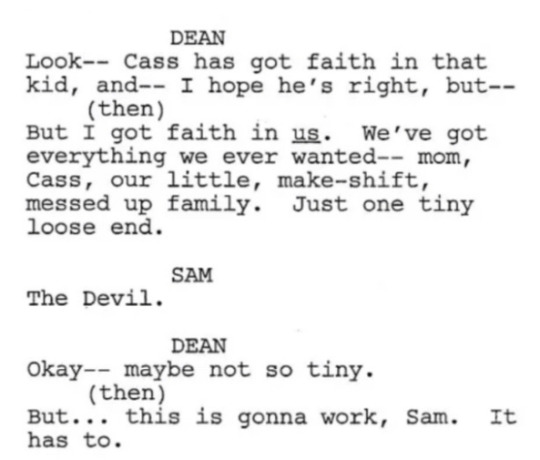
Ah, yes. Everything Dean's we've always wanted. This comes shortly after meeting Max & Alicia Banes on 12x20, who also use "We" to cloak their individual wants and needs, like a shield. So what are the requirements for this everything-I've-always-wanted?
Mary (a flawed-but-Loving Parent-Hero; the symbolic road to accepting Our Imperfect Selves)
Cas ("Flawed Father Material" who is Brave, Dutiful, and Devoted; the One Who Carries Your Burden-Halved; the symbolic road to de-Romanticizing White Picket Fence & Apple Pie Life)
Sammy (the child who finally Grew into Leadership; circa season 12; The one who leads the American hunters against The British Men of Letters; the one who elevates the Family Legacy; the symbolic road to dealing with The Moral Gray of life)
///
We also get this aired line from 12x22:
DEAN: (dejectedly) Yeah. You know, it wasn't long ago, I thought we had it made. We saved the world. We got Cas back. We had Mom back. I mean, it wasn't perfect, but still, we had 'em.
It wasn't perfect. Like I was thinking in this season 8 post, this represents the acceptance of De-Romanticizing the Apple Pie Life.
#spn 12x23#spn all along the watchtower#shallowseeker thoughts#spn hunter heroici#spn themes#dean + everything i've ever wanted#tfw + the apple pie life#tfw + romanticized white picket fence#tfw + the imperfect self#spn + themes#spn season 12#tfw + integration
49 notes
·
View notes
Text
To me, the way Anna fell, to become a human child, is meaningful in of itself.
If I were put in charge of writing Anna, in a reboot or otherwise, I would base it primarily around the concept of parents defending their children, and Anna longing for that (rather than sex, loyalty, chocolate cake, etc). It's not that those things aren't important, but that the the specter of Anna falling to become a child, wanting to be protected by her parents...it would hit SO hard.
Her deepest fear is her father killing her, after all.
Imagine fully-angelic Anna witnessing a mom rocking an innocent child and calling it "her little angel." Imagine Anna killing children, and watching parents do everything in their power to stop it. The ferocity of their defense would have such an impact, you know?
I REALLY like that approach.
#spn anna#tfw + angels#spn themes#theme ideas#tfw + parents and children#spn parenting#fic ideas#spn + soldier mentality#spn + angels#angelic duty#angelic war
16 notes
·
View notes
Photo
He never knew a stable home. He only knew pain and loss. And then he went to hell... 😢









Look, I never had what you had with mom and dad, okay?
25K notes
·
View notes
Text
“If Castiel were a woman destiel would have been canon” if Castiel was a woman she would have been killed off in season 4 because everyone would have screamed and pulled their hair out over how much they hate her for the crime of holding Dean’s attention and bashed for being a dumb bitch who never does anything right and a waste of screen time like every other woman, destiel never would have been a concept to start if Castiel had been a woman
3K notes
·
View notes
Text

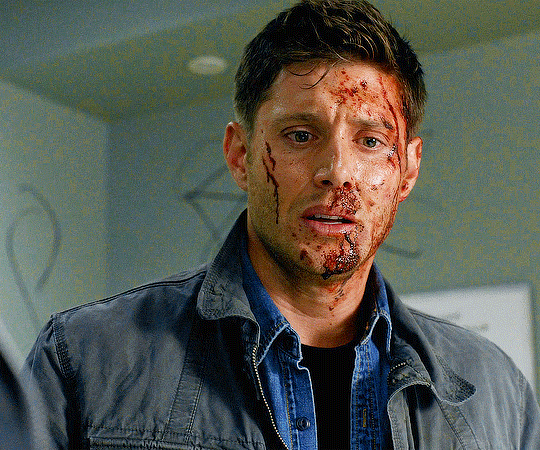
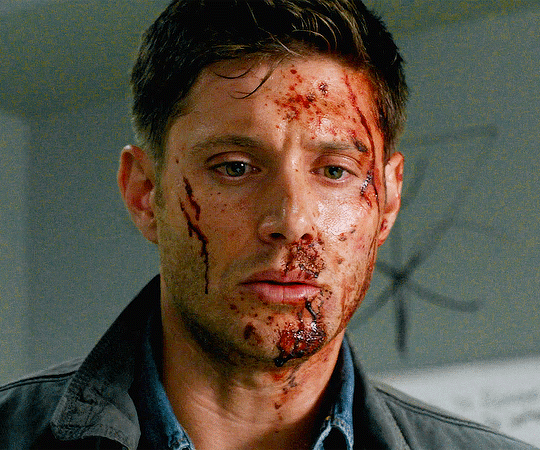
JENSEN ACKLES as DEAN WINCHESTER Supernatural | I Think I'm Gonna Like It Here (9.01)
#supernatural#dean winchester#forever fave#jensen ackles#supernaturaledit#deanwinchesteredit#jensenacklesedit#spnedit#deanedit#jacklesedit#tvedit#edits#spn 9x01#spn s9#bloody dean#is becoming a theme on my blog
2K notes
·
View notes
Text
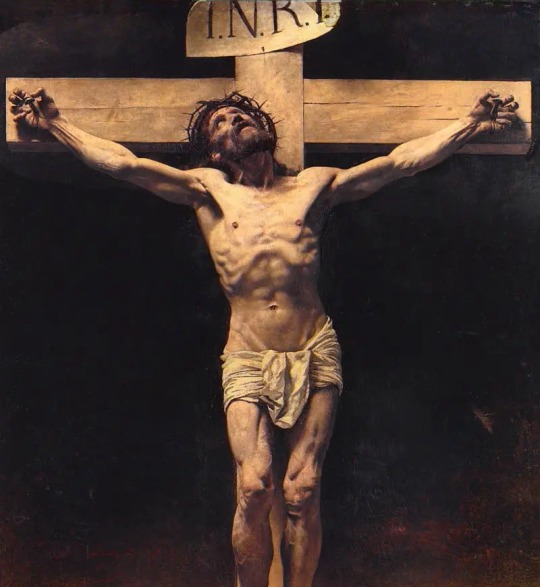
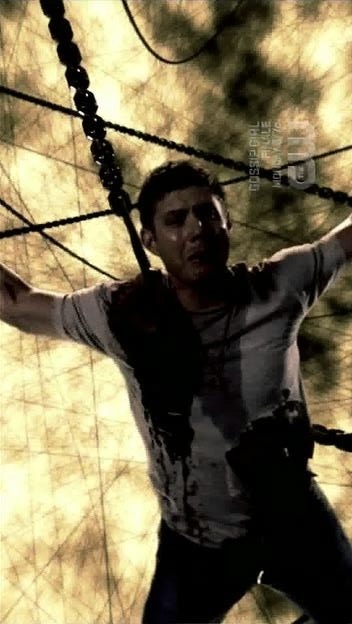
Jesus Christ on the Cross // The Righteous Man on the Rack
#honestly cas never stood a chance#he would have loved deans parallels with Jesus and the blasphemy of it all#a man with an absent father who wants to do good and make the world better and is crucified for it#honestly Cas probably flirted with Jesus#supernatural#spn#dean winchester#destiel#they’re the same picture#castiel#deancas#jensen ackles#spn crack#spn parallels#religious themes#religious parallels#the righteous man
1K notes
·
View notes
Text
follow this vein to Castiel's singleminded focus in s6 mirroring Soulless!Sam's, leading to s7 when Castiel takes on the echoes of Sam's hell trauma as penance---for leaving Sam's soul, for breaking his wall, for the leviathans.
cas let sam out of the panic room so that he would free lucifer; cas pulled sam out of the cage after he locked lucifer away again. two moments when cas frees sam that are very different and also incredibly linked. cas’s mistakes were tied to sam’s, and his redemption was tied to sam’s redemption, in a twisted kind of way, and i think there’s some aspect of it that went along the lines of i am part of the path that led you here, so i will save you from it now. idk. there’s just something about s4 & 5 sam and cas
30 notes
·
View notes
Text
†These crosses all over my body remind me of who I used to be.†

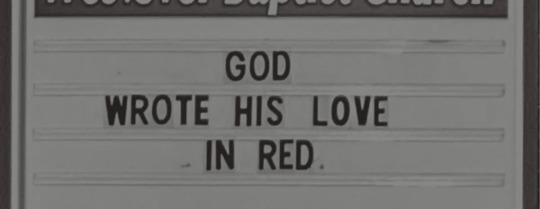
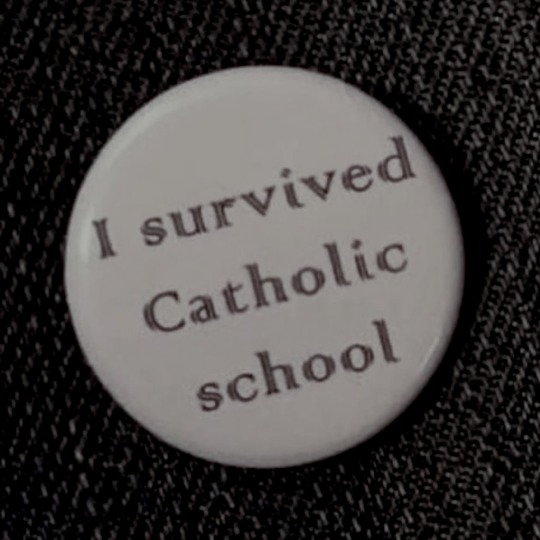
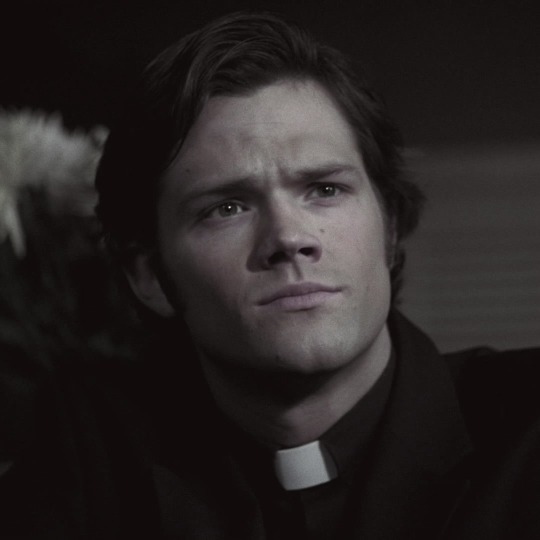
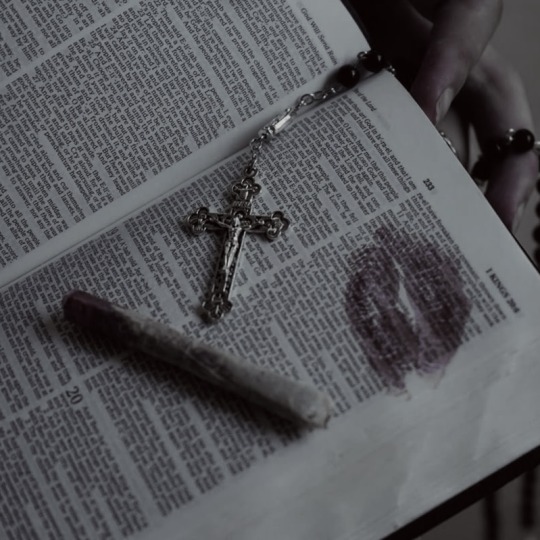
SUMMARY: Sam and Dean dress up as priest to investigate some mysterious deaths. What Sam does not expect is to find himself a little sacrificial lamb in the process. 4.7k
WARNINGS: smut (mdni). religious themes. religious trauma. mentions of self-harm. reader is an ex-catholic. one tiny scene of s.a. but nothing really happens. car sex. unprotected piv. blasphemy. priest kink. reader is heavily traumatized. if you're extremely religious or sensitive to religious imagery pls don't read. writer is also heavily traumatized and has a thing for rosaries.
NOTES: here i am again, writing about priest!sam. everyone say thank you ethel cain. as always, english is not my first language. enjoy<3

You knew something was going to happen today, you just didn’t expect it to come in the shape of a hot priest.
Your friend Alex’s cousin died a day ago. He was found in his room, his own wired earphones wrapped around his neck. He didn’t hang himself, instead he had somehow pulled on the earphones for long enough to kill himself. The police couldn’t really explain it, but there was no sign of break in or the presence of anyone else in the room either.
You had only met the guy once, which made your presence at his wake just a little awkward. It was supposed to be a family-and-close-friends-only kind of thing, but it was being held at Alex’s house, and she had begged you to come.
Alex didn’t have the best relationship with her family. They were all very religious, strict, and… moralistic. Her parents weren’t that bad, but the rest of the family was pretty awful. They never skipped a chance to comment on her clothes, or question her career decisions, and God forbid they saw her even glance at the beers her uncles were drinking like holy water.
You once even had to hear one of her aunts ask what was taking so long for her to get a husband and start having kids. You were both 20 at the time.
Now, two years later, you’re trapped in one small house with at least twenty of them. You convinced Alex’s mom that there would be too many people and she’d be way too busy to serve them all, so you offered to help by passing around snacks and drinks. It worked, and she let you stay. But that means you’re now stuck in the corner of the living room with a tray full of mini chocolate chip cookies, smiling at a bunch of people you really don’t like.
Alex had advised you to dress up for the occasion, and you had to dig deep into your closet to find the clothes you used to wear when you actually attended church. You wore a black dress that was supposed to hit your knees, but since you hadn’t worn it since you were a teen, it now hit almost at mid-thigh. It earned you a few questioning looks from the grand-aunts, but at least it covered what it needed to.
In your search, you also found an old rosary. It used to be your favorite, and the sight of it made you feel nauseous for just a second. Still, just for Alex, you placed it around your neck and pretended it didn’t drag you back to the dark times.
It used to be a comfort to have around your neck. Now, it’s tight and itchy. Like a noose, or a leash, or both.
It feels like a punishment—like the weight of sins you no longer believe in but still carry.
You’re walking toward a group of gossiping women—so much for “Do not go about spreading slander among your people,” you guess—when two new people walk through the door. You start to dread the presence of more self-righteous old assholes… until you actually catch sight of them.
Two priests enter the living room, followed by Alex’s father. They’re in full getup—suits, Bibles, and clerical collars. And they are insanely hot.
Both guys look younger than thirty, and they’re explaining something to Alex’s parents. You stare for a moment longer than necessary, until the shorter one glances over and catches your eye.
You immediately turn around and start walking somewhere, anywhere. You try to find your friend, but she’s nowhere in sight, so you just head toward the group of ladies you were originally aiming for and offer them some cookies.
That’s when Alex’s mother finds you and hands you a new tray with the mini-pies you and her daughter made yesterday.
“The church sent their two new junior priests to pay their respects. Isn’t that so kind of them?” she asks, genuinely touched by it. You try not to grimace. “Go and offer them the pies, and make sure to get them everything they need.”
Cool. Now you had to serve two literal clerics. Like this day couldn’t get any worse.
You’re awkward and shy when around people you find attractive, so you walk up to the men with your eyes on the floor and a mental chant of don’t trip, don’t trip, don’t trip.
“Uhm—mini-pies?”
You meet their eyes for a second. First the shorter one’s, who at the mention of pie immediately looks toward the tray and starts digging in. Okay, safe. Then your eyes drift to the taller one.
And Holy fucking God indeed.
The guy is absolutely gorgeous. Big hazel eyes, his styled long hair already falling onto his forehead a bit from the heat of the summer, and just so fucking tall. You can only hold eye contact for a second before your gaze drops back to the floor.
“Hell yeah.” exclaims the first guy, mouth stuffed with mini-pies.
You raise your eyebrows, surprised by his cursing. Some priests, huh?
It’s not the most blasphemous thing you’ve seen a man of the church do anyway, so you don’t comment on it.
The taller—giant, just fucking huge—man sends him a glare and rolls his eyes.
“Excuse him, he is our newest recruit. I’m Father Frehley.” He presents himself, extending his hand towards you.
For the smallest second, you’re overcome with terror. That hand, sliding out from a black sleeve, framed by the white, crisp cuffs—it’s too familiar. Too sickening.
You swallow it. Don’t be fucking pathetic. Get over it.
You struggle a bit to grab the tray with just one hand, movements clumsy with nerves, but the other guy helps you by grabbing the whole tray and immediately devouring the rest of the mini-pies.
You shake Father Frehley’s hand, meeting his eyes again. One, two, three, four… you look away. Okay, an improvement.
“This is Father Simmons.”
The shorter guy shakes his hand in greeting gesture, crumbs and blueberry filling all over his mouth. You frown a little, looking back and forth between the priests.
“Frehley and Simmons? Like… Kiss?” You raise an eyebrow, making both men stare at you, taken aback for a second, before Frehley chuckles and lowers his head.
“Yeah, exactly. Freakish coincidence.”
You’re still a bit skeptical, but you let it go. You already had enough to deal with today.
“So, are you the daughter of the homeowners?” Simmons asks, using a napkin to clean the remains of mini-pies off his face.
You shake your head quickly. “Oh, no. No, I am their daughter Alex’s friend.” You introduce yourself.
“So you knew the deceased?” Frehley asks, glancing around the room. You take the chance to study his features. Once his eyes return to you, you look down at your hands.
“Not really. I think I met him once or twice,” you shrug. The priests look a bit confused, so you continue. “The truth is, Alex doesn’t really… get along with some of the people here.”
You glance around the room again, trying to find Alex. She’s alone at the dessert table, looking like she definitely needs a sweet treat. But she doesn’t need rescuing—yet.
“I’m here for moral support. Even though I don’t like them much either.”
“Well, it is in times like this when the Lord wants us to support each other the most,” Simmons begins. “I’m sure He is pleased with you—”
That’d be a new one, he never seemed to be before.
You can’t help the snort that escapes you but you quickly turn to the priests, apologetic.
“Sorry, sorry. I didn’t mean to disrespect you,” you add quickly. “Thank you for your words.”
You try to sound as genuine as possible, but you’re pretty sure your expression gives you away.
“So why do they have you handing out snacks?” Frehley asks in a low voice, leaning forward a bit. God, his voice is so smooth and warm. Maybe you wouldn’t mind attending Mass if he were the one directing it.
“That’s how I convinced her mom to let me stay.” You sigh, shaking your head. Come on, girl. That was a Father. “But my real mission is to keep an eye on Alex. The moment some invasive family member tries to interrogate her, I slide in and interrupt the speech with some desserts.”
Both men chuckle at your words, and you study their faces again. What were two sexy guys like that doing in the church? You guess life does work in mysterious ways.
They continue asking what you know about the cousin’s death. You recount what you’ve heard, always keeping an eye on your friend. At some point, you two make eye contact, and she sends you one of those “those guys are fine” looks. You have to bite down a laugh.
“It was nice of you to come.” you add once the silence gets a bit awkward. “I am sure many here find comfort in your presence.”
“Not you, though?” Simmons jokes, and you can’t help but let out an amused huff.
“That obvious?”
“Just a bit.” Frehley looks at you with the prettiest smile you’ve ever seen. You swear this is divine punishment.
“Yeah, well… my relationship with religion isn’t the best.” you avert your gaze again. “Grew up very Catholic—and I’m talking all-girls, nun-run Catholic school kinda thing.”
And now I feel guilty for breathing… and also kinda wanna fuck a priest.
“Oh, so the hardcore stuff.” Simmons teases, and it makes you laugh.
“But you’re not anymore?”
You shake your head. “No,” You had worked for years to keep the apology out of your voice when you said this. “I’m not.”
The eyes of the Christ in the front of the bible being held in Frehley’s arms burn into your skin.
“Let's say my relationship with God is very complicated.” You scoff, taking in a deep breath. “I really don’t mean to offend, but… many things happened that made me—well, not a fan of all things religious.” The scars on your back ache just a little, but you ignore it.
Both priests nod, and they don’t seem angry. They’re young, and seem smart enough to understand. You relax a bit, feeling less uncomfortable than you usually do around clergy members.
You feel both their eyes on you then, so your gaze drifts around the living room. And thank every deity you’ve ever heard of—because there’s Alex, cornered by the man you two had dubbed Creepy Uncle.
You quickly grab the old tray with the cookies (Simmons had finished off all the mini-pies) and turn back to the priests.
“Well, it was nice meeting you, Fathers,” you say quickly, walking backward. “I think the mom’s in the kitchen if you wanna talk to her—but right now, I’ve gotta go play superhero.”
Turns out, going to save Alex from Creepy Uncle was a very bad idea. Because the moment she’s out of sight, he latches onto you.
He keeps inching closer, backing you up against the dessert table. His breath reeks of beer, and the way he pronounces every word—slow, suggestive, like he thinks he’s clever—makes your skin crawl. Even the spit flying from his mouth feels calculated. It all reminds you of the men from your old church: the cheating husbands who hovered near high schoolers, that one youth pastor you still try not to think about.
His hand starts to move toward you, and you freeze. Too many years of being taught not to fight back. Your stomach flips as his fingers reach for a strand of your hair—
And then your guardian angel steps in.
“Mrs. Evergreen wants us to pray.” Frehley hovers behind Creepy Uncle. His dark eyes and twisted mouth make him look menacing, almost scary. Like a predator—big, stealthy, quiet, but ready to sink his teeth into your jugular if he had to.
A different kind of fear bubbles inside you. The kind that makes you press your thighs together, heat pooling in your lower stomach.
Creepy Uncle finally leaves, looking bashful in front of the priest.
Frehley gives you a careful yet somehow comforting look before walking away to stand next to Simmons.
You stay in the back, hiding in the corner of the living room as the family begins to pray. You try to keep your expression neutral, forcing yourself to be respectful. Not everyone who believes in God is bad, you tell yourself, over and over.
A few tears are shed during the more emotional speeches. The priests stand in the background, both of them looking a little lost. Did the church really send their newest, least-prepared members for this?
You’re already congratulating yourself for how well you're handling the situation when Alex’s aunt, the mother of the deceased, walks to the front of the room.
“Oh merciful God, I beg for you to forgive me.”
There it is. You see it in her eyes, her trembling hands, the pained tremor in her voice. The guilt, the shame, the self-blame. The same weight that was once tattooed into you, the one you can’t seem to get rid of.
Her son is dead, and she’s apologizing for it.
You shift on your feet, swallowing the lump forming in your throat. It tastes like wine and sacramental bread, the same taste that was forced into your mouth the day of your first communion.
“I confess to almighty God, and to you, my brothers and sisters, that I have greatly sinned.”
No. No, no, no, no, no.
“In my thoughts and in my words, in what I have done, and in what I have failed to do.”
Your knees weaken, and your throat tightens. Not this one. Not this prayer. Not again.
“Through my fault, through my fault, through my most grievous fault;”
You’re drowning, choking, dying. The rosary around your neck tightens. The crucifix on the wall looms over you, ready to strike. God is here, and He demands repentance with blood.
“Therefore I ask blessed Mary ever-Virgin, all the Angels and…”
You run. You did back then, and you do now.
You stumble out of the house, breath ragged, panic clawing at you.
Mea culpa, mea culpa, mea máxima culpa.
You fall to your knees on the sidewalk, skin scraping like it did when you spent every waking moment kneeling.
Mea culpa, mea culpa, mea máxima culpa.
The church chorus, the smell of incense, the bleeding Christ.
Mea culpa, mea culpa, mea máxima culpa.
The fear of punishment, the confessional’s dark embrace, the heavy footsteps of the pastor behind you, the crushing need to repent.
Mea culpa, mea culpa, mea máxima culpa.
Sin. You’re a sinner. The snap of leather against your skin.
Mea culpa, mea culpa, mea máxima culpa.
The cold floor beneath your hands and knees, the warm blood trickling down your back. Your firm grip on the whip.
Mea culpa, mea culpa, mea máxima culpa.
“Hey, are you okay?”
The sudden voice makes you jump. You look up quickly, meeting Frehley’s gentle, hazel eyes. You try to steady your breathing, to rise on shaky legs.
The priest offers a hand. You take it.
It’s the first time you’ve felt the gentle touch of a cleric.
You clear your throat quickly, wiping away a stray tear you hadn’t noticed rolling down your cheek.
“Yeah, Father Frehley,” you choke out, the title catching in your throat. “‘M fine, just—had a moment there.”
You laugh, like you always do in these moments. Because you either laugh, or you lose your mind.
There’s a moment of silence in which the priest studies you slowly, as you try to get your body back in check—pushing the panic back into the little sealed box in the deepest part of your brain, the one you designed for it years ago.
“Sam,” Frehley murmurs, and you look up at him, confused. “That’s my name. You can call me Sam.”
It makes your heart slow a little, your breathing gradually steadying. You nod, running a hand through your hair.
“Sam.” you say it slowly, savoring it. It still tastes religious—but differently.
Like salvation. Like sin. Divine, almost. Godly.
“Aren’t you supposed to be leading the prayer?” you ask once you’ve composed yourself, forcing a relaxed smile back onto your face, even though your hands still tremble and something remains lodged in your throat.
The bite of the forbidden fruit—damning you to be crucified for sins committed long before your conception.
“Father Simmons is on it,” he says with a hint of amusement, and you can’t help but imagine the pie-smudged, cursing priest standing before Alex’s puritan family. You almost laugh.
“You’re bleeding.”
You look down, feeling the warmth of blood running down your legs. Somehow, your knees always end up bloody.
“I’ve been for a while.” The words slip out before you can stop them—too honest, too painful. Sam’s worried gaze catches you, but you quickly try to brush it off. “It’s okay. I’ll just go inside and clean up.”
But the thought of going back inside that house makes your stomach turn. You glance at the front door, where the words “God loves you” on the rug seem almost mocking.
“My b—Simmons’ car is parked nearby,” Sam stutters, and it ignites the doubt in your mind again. “We have a first-aid kit. You don’t have to go back there.”
He nods towards a black classic car parked down the street, and you hesitate for a moment before following him toward it.
You might as well.
If anything, dying in the hands of a psychopathic priest would be the biggest cosmic joke ever written.
Sam, movements slow and steady, opens the backseat door for you.
You sit sideways on the leather seat, legs dangling out the open door, body angled toward the street. It feels exposed, vulnerable, like a patient waiting in a pew. Sam moves to the trunk, retrieving what you assume is the first-aid kit.
Feeling more than a little nervous about being alone with a man who is not only a cleric but also hot as hell, your hand unconsciously reaches for your rosary, fingers curling around the cross like they used to when you were a child.
Your long, slender fingers wrap around the same crucifix your chubby, sticky ones once did. They fidget just like they used to—during Mass, in religion class, or when your mother was screaming behind the door.
A moment later, you realize what you’re doing. You yank your hand away so fast it hits the car doorframe with a dull thud.
After all these years. After you’ve scrubbed your skin raw trying to wash it away. After clawing at your flesh with teeth and nails to purge every drop of holy water you were bathed in.
Your hand still reaches for the rosary.
“Got it.” Sam appears in front of you, white box in hand, pulling you back from the dark void you were about to fall into.
That’s when he kneels, right before you.
Your breath hitches at the sight. Sam, with broad shoulders and a clerical collar, kneeling right before you.
He leaves the kit on the ground and opens it, first grabbing a cloth and some antiseptic. He leans in, and your legs unconsciously part.
One of his hands—calloused in a way you knew clerics' hands never were—wraps around your calf, long fingers closing around your flesh reverently. His other hand, the one holding the cloth, presses it gently against the wound, cleaning the dripping blood.
Sam moves even closer, getting right between your legs.
It’s too much. The white cuffs and black sleeves of the hands around your leg, the old Sunday Mass dress riling up your thighs, the rosary rising and falling on your chest with every heavy breath.
You feel wetness pooling in your cunt, soaking your lacy panties. You wonder if Sam can smell it, if he can taste your arousal from where he is—so close, yet so far away.
If he does, he doesn’t react. He continues to clean the blood off your knees, some of it getting onto his fingers. He doesn’t notice, and when he goes to adjust his collar, it gets stained.
The impeccable white square, symbol of devotion, of discipline, stained with blood. Your blood.
There’s something deeply metaphorical and insightful to be drawn from that, but your brain is too busy malfunctioning to process it.
Your breathing grows heavier, and you can't help the way your thighs press together.
This time, Sam notices.
"Is something wrong?" he asks, and it almost sounds genuine. But there's an edge to his voice, a sparkle in his eyes, that betrays he knows exactly what he's doing.
He keeps his composure, his serious face and benevolent attitude, but his fingers brush your inner thigh, and his smile is just a touch wicked.
It should make you want to run. Should make you scream for help. Should make you sick with flashbacks. Another perverted priest, another wolf in sheep’s clothing, another rotten apple. But instead, your legs part wider.
Corruption. Sin, dark and simmering. Lust, calling your name, burning like hellfire. Punishment, the good kind. Depravity. Profanation. Temptation. Blasphemy.
You’re not sure who kisses who—whether you tilt your head down or Sam leans forward—but his lips are soon engulfing yours. It’s violent, almost. Teeth clashing, tongues twisting. Carnal. Heretic.
Something fills your chest. A blaze, white and pure, that lights you up from the inside out. Edenic, sweet like the juice of Eve’s apple. Dizzying, like the poison of the snake.
I am kissing a priest. Oh, Alex is going to have a field day with this one.
Sam rises from the ground and leans over you, guiding you to slide deeper into the backseat of the car.
Once you're both inside, Sam breaks the kiss and turns to close the door. You lie back on the cold leather seat, eyes following his figure as he looms over you—so much bigger, imposing, intimidating. He blocks your only way out, and when he looks down at you, his eyes are full of vice.
“Look at you,” he whispers, his hands returning to your soft thighs. He slides them up slowly, carefully rucking up the dress. “So soft, darling.”
You shiver at his touch, licking your lower lip before biting down on it. You aren’t sure what to say, how to act.
Lust, the greatest sin of all. Sex, the doom of humanity. Arousal, something you couldn’t experience without the ghost of guilt tingling at the nape of your neck.
Taught to be virgin-pure. Tainted from birth.
Trained to feel shame in your pleasure. Learned to find pleasure in your shame.
“Don’t be shy, baby,” Sam whispers in your ear, his hands sliding to your waist beneath the flowy dress. “You want this, I can tell.”
Your back arches as his thumbs slip under the waistband of your panties, your breaths escaping in soft, shaky puffs.
You push away the voice—the one that echoes through your mind like a pastor’s sermon—preaching about chastity.
“I do,” you whisper, your hands gathering the hem of your dress and sliding it off your body, tossing it to the floor of the car. You lie there in lacy underwear, bare and exposed. The rosary still hangs around your neck, slithering down the valley of your breasts like a snake.
“Fuck me so hard it purifies me.”
Sam curses under his breath, eyes devouring you—like he’s imagining every way he could ruin you.
He quickly shrugs off his suit jacket, leaving him only in a black shirt and the blood-stained collar. When he goes to take it off, you stop him.
“Leave it on.” You whisper, pulling him down until you’re chest to chest.
“Okay, you little heathen.”
It’s only a few minutes—and an orgasm—later when Sam finally slides inside you. Raw. Depraved. Skin against skin. Unholy.
“You’re dripping, baby.” Sam murmurs, moving his hips with reverence, making you throw your head back and moan. “Your sweet little cunt so tight around me, fuck.”
Sam is big, bigger than anyone else you’ve ever had. He fills you so deep it aches, stretching you open in a way that toes the line between pain and pleasure.
You're acutely aware of every sensation. The ache of the stretch. The sting of old scars brushing against the leather as you rock with every one of Sam’s thrusts. His nails digging into your thighs. His teeth sinking into the soft flesh of your neck—marking you as condemned. The rosary beads biting into your nape when he grabs hold and tugs, pulling you down onto his cock.
You relish the pain—all of it colliding and bursting inside your chest, transfiguring into pure, burning pleasure.
Pleasure. Pain. They’ve always felt like one and the same to you.
Your hands grip his shoulders, back arched, mouth open in ecstasy.
Sam’s thrusts are merciless. Relentless. Unforgiving. His slicked-back hair now falls over his forehead, teeth gritted, sleeves shoved up to his forearms.
When his hand drops the rosary and slides down—south, to where you need him most—something inside you explodes, a strangled moan tearing from your throat.
“That’s it, sweet girl,” he whispers, rubbing slow circles on your clit as you come undone. “Fuck, you’re divine.”
Your peak is so high, you think you see paradise, your vision blanking out. It’s an all-consuming fire, wrapping around you, angelic and demonic all at once.
Then you feel Sam’s hips stutter, his warmth flooding you like holy water, filling you up completely.
You’re reborn. Burned to ash and pieced back together. It hurts, like crucifixion for your sins, but then Sam kisses you—soft, gentle—and you’re resurrected.
Washed clean. Ruined to the core.
Moments later, you lie on top of Sam in the cramped backseat. His chest is so broad, he barely fits, his legs tangled with yours. You slot against him like a missing puzzle piece, still boneless, fucked out. Stripped raw, drunk on sin.
Bruises mar your skin—on your neck, between your thighs. Little purple marks you’ll later press on, the ache both punishment and reward.
Sam’s fingers trail up and down your back, grazing the raised, silvery skin. He traces shapes over the crosshatched, uneven texture with such tenderness that it might bring tears to your eyes—if you weren’t so blissed out.
“Can I ask about these?” Sam’s voice is low, rumbling through his chest, sending a deep sense of peace through you. You nod against his collarbone, lips brushing lightly over the clerical collar. “How did you get them?”
“Self-flagellation,” you murmur after a long pause. Sam stiffens beneath you, his hand freezing on your back.
It makes you frown. You know some churches nowadays are a bit more “progressive,” but no priest would ever be shocked at the concept of corporal penance.
You raise your head, perching it on Sam’s chest and looking him in the eyes.
The setting sun filtered through the car window, washing him in warm light. His eyes, green with a rim of brown and just the shiniest golden flecks, wide and shiny, looking up at you like a kicked puppy.
He looked gorgeous, with his eyebrows furrowed and his hair messy. His golden skin glowy and his soft lips pursed. The kind of beauty you only see in stained glass. Tragic. Romantic. Sacrosanct. Godforsaken.
“You’re not a real priest.” It isn’t a question.
Sam’s mouth falls open, but he’s at a loss for words.
Then there's a knock on the window, and—
“Dude, you will never guess whose number I just—”
Yeah, definitely not priests.
It isn’t until you’ve slid back into your dress and you’re sitting on the sidewalk, because Dean would “not get into Baby right after you two profaned it, you little sinners” that Sam and Dean explain their job and what they are actually doing in Alex’s house.
Many things go through your mind. Things like “ghosts are real?” and “demons? Holy shit.” and “I just revealed my priest-kink to a non-priest, that is so embarrassing.”
But most importantly, you think about Sam’s gentle eyes on you, shining with just a bit too much affection for someone who he just met. About how his soothing touch could become so brutal when you needed it. How it had been him that whispered things like “you sweet, mourning lamb” and “let me sanctify you” and “you’re heaven-sent, baby. Made by Him just for me to ruin.”
And you wonder, as Dean rants to Sam about getting a motel room next time, if there’s any chance Sam could sneak you two into a church.

NOTES: this was pretty cathartic to write ngl. VERY self-indulgent but still. fuck the catholic church, guys. while i was writing i kept coming up with other priest/religious ideas and idk how to make myself stop. i might create a whole series of priest!sam at this point. anyway, hope you liked it!
TAGS: @littlesoulshine @mostlymarvelgirl @pink-ghost666 @h8aaz @otteropera @xoswiftieprincess @tinas111 @blossomingorchids @iloveeveryoneyoureamazing @plasticflowersinahistorycemetery @losers-clvb @pieandflannel<3
If you wanna be tagged in future works, let me know!!
#sacr1ficialang3l#tw religious themes#religious trauma#supernatural#sam winchester#sam winchester x reader#sam winchester smut#sam winchester imagine#supernatural x reader#sam winchester x you#dean winchester#spn#jared padalecki#jared fucking padalecki#jared padalecki x reader#jared padalecki smut#jared padalecki x you#jared padalecki fanfiction#jensen ackles#jensen fucking ackles#sam winchester fanfiction#sam winchester fic#sam winchester priest outfit#smut#spn smut#spn x reader#smut fanfiction#supernatural fanfiction#sam winchester x female!reader#sam winchester one shot
430 notes
·
View notes
Note
all i can think about is frat boy dean whos dating his nerdy little girlfriend and comes over to her dorm when shes studying and shes like struggling but dean tries to help her study even though he doesnt know shit😭 and then hes like “yeah i have no idea what im even saying” while hes trying to explain random crap
anyways ur theme is so cute!!
all of the classes dean was in, she was in the advanced placements for, pretty much an entire year above him. she was so damn smart that dean sometimes felt like she was humbling herself being around him and choosing him, especially in instances like this, where she'd asked him to study with her, and he realized quickly he does not know how to study properly.
"well, see," he's half leaned over her shoulder, chin resting in the little notch between her neck and arm, "the data's gotta have the answer. wouldn't be part of the question if it didn't."
dean did not have a clue what he was looking at. a table chart with so many numbers. a paragraph above it explaining the numbers and adding additional data. the practice question wasn't even multiple choice; who did that?
her smile is slow, and dean knows that again, he's said the wrong thing. but if there's one thing dean does know how to do, is dig his own grave. "like, math, right?" it was science. chemistry. whatever. "take all the numbers, add 'em up, get the average..."
well, now her eye was twitching, like a parent barely refraining from taking the pen and doing the problem themselves. dean's starting to stutter over his explanation. technically, she did ask for this, asking him for assistance, so... "then multiply the average by the number of sections on the chart. with all those steps, it's gotta be the way, baby, trust."
his beautiful, intelligent, quiet girlfriend did not say a word to argue. instead, she did something worse, and took her pretty pen out of his hand and moved the paper in front of her again. the silence was overbearing. now dean had completely abandoned his books and wanted to see this damn problem through, just out of his own disbelief. they made questions like this? without multiple choice? and all these numbers?
he, in fact, does not shut up, even as she's writing numbers and scribbling them out and repeating. "yeah, babe, to be honest? don't know what the fuck i'm saying."
"i know." two words, and she'd managed to dismantle the fragile confidence he had in chemistry-related things. "but thank you for trying to help in your own way."
she might as well have just stabbed him. "just doin' my job, pretty lady," dean saluted her, tipping his baseball cap at her before plucking it off his head and spinning it around. front facing meant business, backwards meant party. he deserved a party after the couple of braincells in his head had sparked and fizzled out. "hey, how 'bout this," the mischief in his smile is absolutely diabolical considering he was really just starting to hinder you more than anything, "every question either of us get right, we take somethin' off?"
her eyebrows raise. "you're gonna be fully clothed and i'm gonna be naked if we do that."
dean leans in to steal a kiss, that devilish grin still on his mouth. "that's precisely the point. get t'solvin', pretty lady."
she wasn't going to argue. especially not when he used precisely right in a sentence.
#to ☆ anon#stanford!dean#dean winchester#supernatural#spn#dean winchester drabble#dean winchester x you#dean winchester x reader#ALSO THANK U ABT THE THEME<3 LOVE U
371 notes
·
View notes
Text
everyone in the bunker knows somethings up when Dean wakes up early and glides around the kitchen with Cas trailing after him while he makes pancakes in the shape of hearts and wakes everyone up with his loud ass music
#iasip theme “Dean finally gets railed”#i just think it would make him a better person if him and Cas had sex like even one (1) time#cas actually could fix him#destiel#dean winchester#supernatural#spn#castiel#deancas#balls deep destiel
519 notes
·
View notes
Text

something’s got to give.
#demon blood sam winchester#wanted to mess around w the ai disturbance overlays n it lowkey fitted the theme#spn#spn fanart#supernatural#my art#sam winchester#season 4 my beloved
1K notes
·
View notes
Text
Searchin' for a rainbow + Cas's death + forbidden love

If you want to enjoy the rainbow, be prepared to endure the storm.
In season 12, Cas dies on a doomed beach. (It's Washaway Beach, where the effects of the world are claiming an entire town.) In season 15, Cas dies in a dungeon while on the run from Death and God.
In so many ways, the story grinds to a halt when Cas leaves, and so begins the spiral of narrative death, from Dean to Sam & Jack. (Later seasons are so Dean-and-Cas-driven that it's maddening.)
///
The rainbow, the valley, and the mountain
The rainbow is the illusory happiness, visible in the distance but seemingly impossible to reach. (It never quite seems to reach the horizon, the meeting point of Heaven and Earth.)
Cas is Heaven. Dean is Earth. All the characters are struggling to live, to find that ephemeral "rainbow" of happiness and peace, where these two meet.
Heaven is associated to high places, like mountains. And Earth, like Dean's namesake, is the fertile low valley.
///

Cas is an angel on high
When Cas goes down into the valley, he changes. As he nears Dean/Earth/bunker/human family, he becomes weak with sentiment.
Much of Cas's storyline veers between the push-pull between modes of strength and weakness. Cas struggles to find the balance between the tyrant, the king, or the weakling.
Cas yearns to be more emotional, like a human. He is paradoxically seeking strength in a low place, within human weakness.
When Cas goes to higher places, he grows colder. In season 6, Cas reaches toward "becoming God." As he flies higher, he becomes stronger but more vindictive, authority-driven, and capricious. (This same thing happens to Dean in season 14-15, when he goes "up" to Moriah.)
CAS: "Brave little ants...you were once my favorite pets."
As God, Cas fails spectacularly and is torn down, like a false idol.
But from this point on, Cas tries more to integrate humanity/emotionality with his angelic nature. The slow acceptance of his own angelic emotions is shown in season 12's Lily Sunder has Some Regrets. This integration becomes a source of strength.
DEAN: "What Ishim said... You're not weak, Cas. You know that, right?"
Cas is learning the meaning of humanity. "My power is made perfect in weakness." His growing emotional courage helps him face his fear. He uses the resilience of his own emotions as an antidote to terror.
(Thanks to seasons 7-11, he goes through these existential crises trials way sooner than seasons 14 & 15- Dean does, and for this, Cas is resilient as fuck. Bullets symbolically bounce off his heart in 15x06 Golden Time.)
Cas almost resolves his narrative tension of destiny versus faith in the future. Cas has come down to earth.
CAS (to Jack): “We love you, not because you fit into some grand design, but because you’re you.”
///

Dean is the low valley, where family and humanity dwell
Dean is “just a man.”
He's weak and afraid, and he thinks that if he were "perfect," and that if the rules of morality were black-and-white, then he wouldn't be so afraid or tormented all the damn time.
Dean yearns to be more unfeeling, like an angel. This yearning is clearly expressed in Heaven and Hell and all of "Purgatory-as-pure" storyline.
DEAN: “How's that possible? You guys are powerful and perfect. You don't doubt yourselves or God or anything.”
And with Purgatory, despite his rebellious nature and denial of destiny, Dean sometimes yearns for clear-cut rules and 24-hr, 360-degree total warfare. It's simpler. Suicidal, even. Post-AU Michael possession, Mary dies, and then Jack symbolically "dies." And Dean crumbles. He seeks the authority and steely unfeelingness of God's work, and Dean goes up on the metaphorical mountain, "Moriah."
In doing so, he comes closer to Heaven and risks aligning with its rigid cruelty. He becomes colder, too.

Lucifer in 12x21, freed and on a mountain. It's an angelic motif.
In Moriah, doing what God says is the act of worship and loyalty that Chuck craves. Not only is Dean going to kill Jack for him, but he's going to use his own soul to do it, killing himself in the process, for Chuck's entertainment.
That's real devotion, right? Kinda like how Lucifer entices his followers to kill themselves for him in season 11's Rock Never Dies.
Dean's cowardice in the face of his fear leads to a loss of direction--a full-on existential crisis not unlike when Cas lost his way in season 6. In season 6, Cas he sought to punish Heaven, and devolved into his season 7 nihilism.
In season 15, Dean goes on a similar journey and buckles under the weight of his own powerlessness and fatalism.
////
The horizon, the happiness, the rainbow 🌈
But what of happiness?
The horizon is where Heaven and Earth meet. This horizon represents the future—the impossible goal of our main characters.
The merging of Heaven and Earth = horizon = "happiness" = "paradise" = Jack Kline
///
But in Supernatural, you're not allowed to choose your own paradise--only God's. You “should” want to be "next to God." By His side.
You shouldn’t want other Gods. You shouldn’t even want to stand next to each other. You should just want God. Chuck.
///
Jewish tradition placed paradise on Templemount (Mt. Moriah) or later along the Jordan valley, be it in Jericho or Bet Shean (in Greek Skytopolis).
These are two paradises: the valley is the garden associated to "plenty," and the mountain is associated with "worship” and doing (angelic) duties for God. Both are idealized, but kept separate from one another.

Dean's two most impactful prayers take place near a horizon and in the Wilderness (metaphysical abandonment by God).
In the image above, it's no accident that the tan car and the family umbrella seating are seen touching the horizon, where the merging of Heaven + Earth (happiness) should take place.
For "humanity/the valley", in order to appreciate its capacity to nurture and nourish, there need to be important people dwelling within it.
A valley without people is just a Big Empty.
///
Going lower

Fleeing to the dungeon + divine punishment
In the end, Dean and Cas try their best to protect "their people," but they are chased by Death. They flee from Death's library into the main part of the bunker.
Dean spins in a panic, "Oh, Cas, what do we do?"
///
A bunker is, symbolically, a safe place/military fortification, a fallout shelter. In Supernatural, it was the place the illegal family of Heaven-and-Earth dwelled; it was perhaps the safest place they could find (from God + from the viewers that demanded story and sacrifice).
///
Death pushes them further still, past the library and past the rooms, down into a literal dungeon.
CAS: "I've got you."
You know. Cas has him. (He doesn't even know how much of Dean he has, actually.)
Cas hauls them down into the dungeon and shuts the door, using his smarts and blood to keep Dean's heart safe. It's like a demented Passover, painting blood on a doorframe to keep Death away from a firstborn.
Unlike Chuck, Cas wants to protect Dean's heart and cherish it, not possess it.
(Note:// The soundscape of Death's booming thuds on the door call to mind the Hellhounds Sam was holding off in 15x13 Destiny's Child.)
///
Cas: dragged to "super Hell?"
Jokingly, a lot of people refer to this scene as Cas being sent to "super!Hell" for his feelings, and although there was some pushback on that being an oversimplification, it's visually and narratively true (see images below).
The viewers are fluent in the imagery of the scene, and the imagery is absolutely communicating divine trap and torture and punishment.
Dean and Cas tried to love each other here, in a Fringe state, a Hell below the blessings of public society/normal life. But even this was forbidden by God.
And so, the cosmic ocean/flood came for Cas.
The dungeon in the valley, which lies on the opposite side of the “field full of folk” from the castle on the hill, symbolizes Hell. Importantly, this Hell exists because they're being chased out of Paradise; they're driven from their home and happiness.
With respect to Jack Kline, Cas is literally suffering an Enochian fate. As Father figure to a Nephilim, Cas is being pulled into an eternal Abyss for the sake of trying to live in a (self-cultivated, Godless) Garden of Earth.
For if God did not spare angels when they sinned, but cast them into hell and committed them to pits of darkness, reserved for judgment 2 Peter (NASB) And angels who did not keep their own domain, but abandoned their proper abode, He has kept in eternal bonds under darkness for the judgment of the great day...since they in the same way as these indulged in gross immorality and went after strange flesh, are exhibited as an example in undergoing the punishment of eternal fire. Jude 6-7 (NASB)
///
There's no sanitizing the fact that Cas IS being killed for loving a human. And the looming visuals work to bold and underline this.
One, they're in a literal dungeon, and two, Dean is "caught" in a Devil's snare. Dean is symbolically trapped in the black torture-chair.
He laments that he's led them into "another" trap, continuing season 15's theme of Dean's existential crisis. (Stupid, worthless, ineffective soldier.) It also echoes his lack of faith in his own judgment, his not-being-able-to-rely-on-his-gut anymore.
For Dean, this is devastating.
///
Then there's this shot: Two handcuffs + The waiting Abyss:

The Abyss appears between two handcuffs. Literal torture. Cosmic enslavement.
//
Cas roughly throws Dean out of the Devil's trap, but in the final scene, we see that Dean's still imprisoned.
There's a bloody handprint on his left shoulder, the mark of humanity. It's the revelation that his heart was always on his sleeve, and it was tied to Cas this entire time.
But his feet are STILL in the trap, and there's still a handcuff looming on his right. His leftside "the symbolic emotional heart" is now saved, but he's still shackled to the narrative on his right.

Dean's alone. Cas took his place in the chair, and now it's just empty and lonely here. Dean's heart is out in the open now, just as Cas's is. That's the real Truth hidden inside the Despair.
It's right there, on his sleeve, but oh--it's bleeding.
///
In the final episode, after Dean dies, it seems to leave only Sam (and metaphorically, Jack-as-God)...in this strange, dreamlike, post-flood world.
But no amount of wallpaper or nostalgia goggles can cover up that the narrative has become about much more than Sam Winchester.
Sam is now like Noah in The Bible (sans boat). He represents a fresh start with a brand new, pure, “normal” family.
Dean and his family had to go.
#dean/cas#cw mcd#character death#dean/cas + nephilim#dean/cas + forbidden love#spn + the valley#spn + mountains#angels + mountain-coded duties#humanity + the valley of plenty#spn themes
7 notes
·
View notes
Text
I think Eileen would get weird about losing Sam
Like, she's a "tough old" gal, per the script. She's died once. She's been to Hell and back. She's been puppeted and manipulated and she's doubted her feelings. Sam's marked by Gods. He's trouble. He's in trouble.
But Sam is her lockscreen.
Sometimes, that scares her.
Maybe even makes her angry.
#eileen + pulling away#eileen/sam#eileen leahy#spn themes#fic ideas#eileen + lone wolf behavior#eileen + avoidance#disaster hunter eileen
3 notes
·
View notes
Text




DEAN - SPN // 7x19 , 10x01, 10x03, 10x17
For @jerksbitch Welcome to Dean ( Jensen ) Love club 🤗
Dean ( Jensen ) love club: @jillmariej @deanwanddamons @deanwinchesterswitch @brilovesdeanwinchester @waywardbaby @spnfangirl1314 @shawnie74 @kwistowee @queenofallerdalehall @charred-angelwings @girlshunttoo @adoptdontshoppets @ddriverpicksthemusic @milo-winchester-4ever @wickedinspirations @quicklymybasement @jensensgotyoudean @lequisha @deansraspberrypie @thoughts-and-funnies @raidens-realm @all-alone-he-turns-to-stone @eevvvaa @doublebill @avanatural @dean-winchester-is-a-warrior @catnipster69
#dean winchester#jensen ackles#supernatural#spn 7x19#spn 10x01#spn 10x03#spn 10x17#demon!dean#moc!dean#mvdeanw edits#mvdeanw gifs#dean gifs#dean winchester gifs#dean winchester edit#dean winchester spn#spn edit#spn gifs#spn various#themed#hands#the hair
547 notes
·
View notes
Text
i started watching season 1 again to recover from the hell that was season 15 and i genuinely forgot how fucking close these two stand together 90% of the time. why are they back to chest shoulder to shoulder in every shot
#it’s been two episodes and there have been so many shots of them like. literally so close they could be one#har har dean in fan fiction saying they don’t stand that close. little man you WERE that close#genuinely like. it’s so. intimate. they are one camera pan away from sam’s breath on dean’s neck#sighs i missed you early seasons wincest themes#supernatural#spn#dean winchester#sam winchester#sam and dean#wincest#sam yaps about spn
143 notes
·
View notes
Text
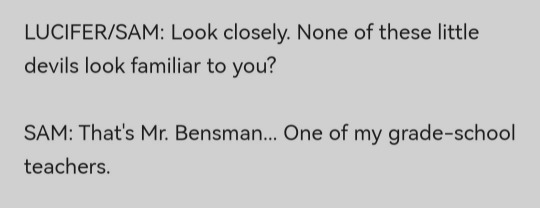
i often think about his elementary school teacher being the first demon/person he recognized before his prom date and his friend + they had so many teachers so this one mustve had a big impact on him and also like. sickening to think about them already following around sam as a child to "keep him on the right path"
#sam winchester#5.22#spn 5x22#also yeah im interpreting it as csa#considering azazel csa metaphor and general sam themes. as well as multiple azazel-related demons being sexual/romantic with him:#his prom date → brady getting him together with jess and using that relationship → meg → ruby#and of course lucifer#so its not really far fetched me thinks#same thing with the clowns❤️ childhood fear that sam refuses to tell dean the reason for#and sam saying “what else could they possibly do to me now” after clowns almost kill him in 7.14#and sam having spent time at those pennywhistle places unsupervised as a child#+ it was gamble era so...#and the other episode about sams fear of clowns being about a clown tricking children into letting them into their house at night#and the parents not believing when their kids told them about the clowns
164 notes
·
View notes